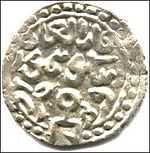Mengu-Timur
Mengu-Timur or Möngke Temür (Mongolian: ᠮᠦᠨᠺᠬᠲᠡᠮᠦᠷ, Мөнхтөмөр) (? - 1280), Son of Toqoqan Khan[1] and Buka Ujin of Oirat[2] and the grandson of Batu Khan. He was a khan of the Golden Horde in 1266-1280.

His name literally means "Eternal Iron" in the Mongolian language.
Early reign and foreign policy
During his reign, the Mongols together with their subjects Russian princes undertook military campaigns against Byzantium (c. 1269-1271), Lithuania (1275), and Alans in Caucasus (1277). The very first yarlyk (license) found by historians was written on behalf of Mengu-Timur and contained information on the release of the Russian Orthodox Church from paying tribute to the Golden Horde, however, he was a shamanist. During the reign of Mengu-Timur, the Genoese traders purchased Caffa from the Mongols. But those Italian merchants paid taxes to Mongol khans and sometimes to Nogai.
Both German crusaders and Lithuanians endangered the safety of Russian lands. In 1268, he sent a Tatar-Mongol force to Novgorod, and forced Livonian Knights to withdraw. In 1274 Smolensk, the last of Russian principalities, became subject to Möngke Temür khan of the Golden Horde. The Khan also dispatched his army along with Russian princes to Lithuania by the request of the duke Lev of Galicia-Volhynia in 1275.
In 1277, he ended the long-duration siege of Alani city Dyadkov with the assistance of his Russian vassals and crushed the rebellion of Bulgars in Kazan. And he allowed German traders to travel freely through his domain.
Golden Horde and the Mongol Empire
Mongke Temur was originally nominated by Kublai Khan.[3] But he was sided with Kaidu who was a genius competitor of the latter. Kublai only stopped him to invade Ilkhanate with large force.[4] Golden Horde helped Kaidu to put down the force of Chagatai Khanate. In 1265, Kaidu was defeated by Chagatai army under Ghiyas-ud-din Baraq. That is why, The Khan of Jochid Ulus sent 30,000 armed-men headed by his uncle Berkhchir to support Kaidu's force. Their victory over Chagatai army forced Ghiyas-ud-din Baraq to initiate peace treaty with them. Together they formed an alliance and demarcated borders of their realms in Talas. Rashid al-Din claims that the meeting took place in the spring of 1269 in Talas, while Wassaf writes that it took place around 1267 to the south of Samarkand. Though He and Kaidu admonished Baraq to invade Ilkhanate, Mongke Temur congratulated Ilkhan Abagha upon his stunning victory over Chagatai army in order to hide his true intention. They two had been probably fighting with each other until 1270's. But some scholars disaffirm that such battles occurred.[5] By the 1270s, they had signed a peace treaty, In addition to peace treaty, Abagha allowed Mongke temur to collect tax income from some of workshops in his khanate.
Although, there was no major wars between the Ilkhanate and the Golden Horde, Mongke Temur intended to restore his ancestors' authority over Azerbaijan and Caucasus. He sent delegates to the Sultan of Mamluk Sultanate, Al-Zahir Baybars and offered joint attack on Abagha's territory.
During that time, Kublai dispatched his favorite son, Nomu Khan, against Kaidu to Almaliq. Nomu Khan sent letters to Chingisid nobles to reassert their support. Mongke Temur responded that he would protect Kublai from Kaidu if he assaulted the Yuan China. In 1276, Chingisid princes Shiregi and Tokhtemur defected to Kaidu's side and arrested Kublai's son. Then they sent Nomu Khan and his brother Kokhcu to Mongke Temur and his general to Kaidu. The court of the Golden Horde released Nomu Khan in 1278[6] or 10 years later.[7] It seems that Mongke Temur held him as a pawn in the wars of the Mongol world.
He died of a neck injury in 1280.
Family
Mengu-Timur was the father of Tochtu Khan by Oljei Khatun of Khunggirad clan, the great granddaughter of Genghis Khan.
Children:
- Tochtu Khan, khan of the Golden Horde from 1291–1312
- Toghrilcha, parent of Ozbeg[1]
- Anna of Yaroslavl, wife of St. Theodore the Black; much of Russian nobility traces descent from her
See also
References
- ↑ 1.0 1.1 David Morgan, The Mongols, p. 224
- ↑ Rashid al-Din - Universal History, Vol. II, p 102
- ↑ History of the Mongols from the 9th to the 19th Century: Part 2. The So-Called Tartars of Russia and Central Asia. Division 1 by Henry Hoyle Howorth, and Otsahi Matsuwo - Khubilai kan
- ↑ J.J.Saunders - The history of Mongol conquests
- ↑ Reuven Amitai Press-Mamluk Ilkhanid war
- ↑ Rene Grousset
- ↑ Rashi al-Din, Encyclopedia of Mongolia and Mongol Empire
| Preceded by Berke |
khan of Blue Horde and Golden Horde 1266 − 1280 |
Succeeded by Tuda-Mengu |